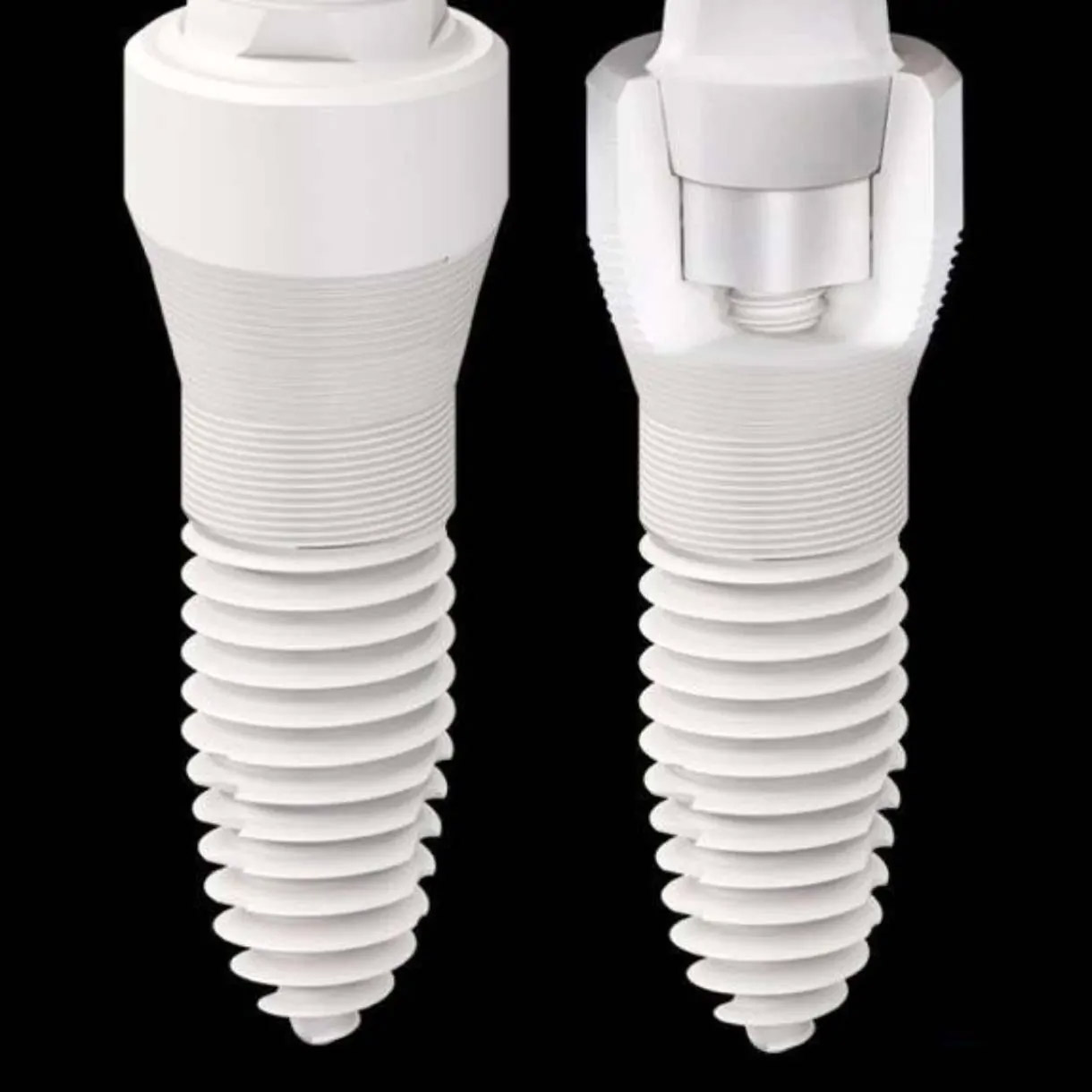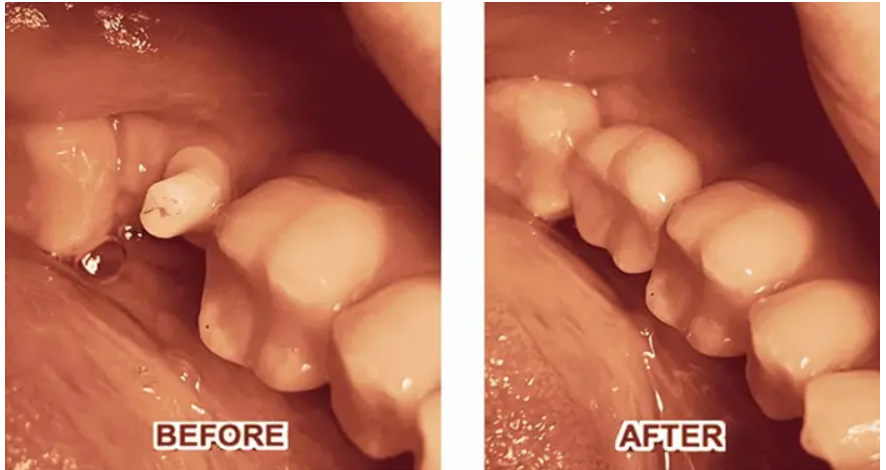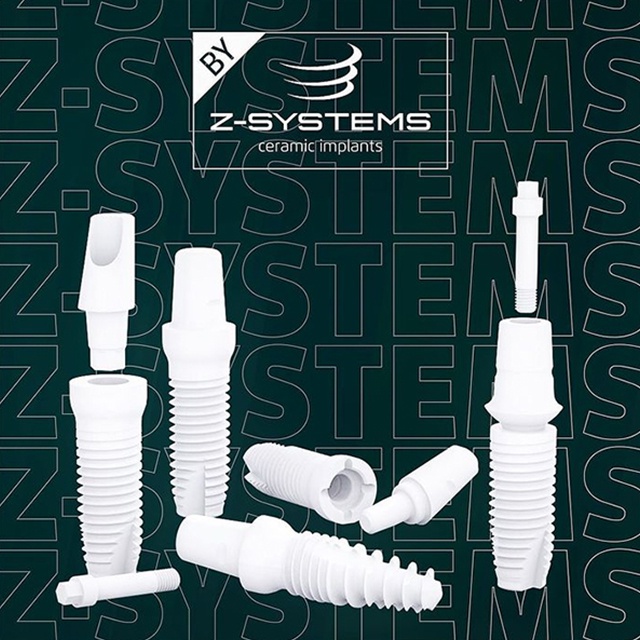Zirconia Implants Fort Lauderdale
Our clinic was one of the first to start installing zirconia implants in Fort Lauderdale. Metal-free teeth implants are suitable for those seeking a holistic approach and decrease the likelihood of allergic reactions. We install some of the best zirconia implants from Switzerland – SDS, Z-System.
What are Zirconia Implants?
Zirconia implants are tooth replacements made from zirconium dioxide. They are crafted from sturdy, white-colored ceramic. Zirconia is a very durable form of ceramic and is biocompatible, 100% metal free, and hypoallergenic for dental implantation. This makes Zirconia teeth implants great for people with allergies or people who don’t want metal in their body. During this time, they have demonstrated excellent results in terms of integration.
How much does a zirconia dental implant cost?
To determine the exact cost, you need to schedule a consultation with the dentist. They will conduct a diagnostic examination. If you have recent X-rays, please bring them with you. If you don't have X-rays, the dentist will take them at the clinic.
The cost of zirconia implants ranges from $2000 to $5000. The cost depends on the number of implants required, the number of appointments and CT scans required and the type of crown chosen. To find out the exact cost of zirconia teeth implants, contact dentist in Fort Lauderdale and book your consultation today!

Zirconia implants are completely safe and, in many ways, are safer than metal implants. Titanium implants can cause allergic reactions, poison your blood and damage your cranial structure. With zirconia implants, there is no risk of allergic reactions or blood poisoning. Also, the chance of rejection is significantly reduced and so is the recovery time.
Advantages of zirconia implants:
-
They do not cause allergiesZirconia particles do not interact with the body's cells, do not enter the blood or lymphatic system, and therefore do not trigger allergic reactions.
-
They do not corrodeThe material is resistant to corrosion and remains unchanged when in contact with bodily fluids. As a result, there is no unpleasant metallic taste in the mouth, and it does not affect the taste of food.
-
They are very strongZirconia is stronger than titanium and can withstand heavy loads. To ensure proper load distribution, the lower part of the implant is made from a stronger alloy, while the upper part is made from a softer one.
-
They reduce the risk of inflammationUnlike titanium implants, zirconia implants are monolithic, making it difficult for pathogenic bacteria to adhere. This reduces the risk of infections and gum inflammation.
-
They do not show through the gum tissueZirconia is a white-colored material, so implants made from it have a natural appearance. Even if the gum tissue recedes, the exposed part of the implant does not draw attention.
-
They have a long lifespanZirconia implants have been actively used for only 10-15 years. However, due to the material's strength and biocompatibility, experts predict that these implants can last for up to 20 years.
A real review of a zirconia tooth implant

The patient came to the clinic with a toothache. After the diagnosis, it was revealed that there was a significant infection in the root canals. The doctor removed the tooth and began preparations for implantation.
Four months after the tooth extraction, Dr. Christian Rouleau placed a zirconia Z-System implant. Dr. Lipovetskiy then proceeded to implant with a zirconia crown. The construction matches the color of the neighboring teeth, giving it a natural appearance.
The implant successfully integrated within just 3 months. The patient can comfortably chew and speak. No inflammations or irritations have occurred, and the smile looks beautiful with a well-aligned and neat gum contour.
How are zirconia implants placed?
The doctor examines the patient's oral cavity, assesses the condition of the gums, and the remaining teeth. The doctor also offers to fill out a questionnaire to exclude possible contraindications.
If the patient has chronic illnesses, the doctor may order tests. These tests are necessary to identify any inflammatory processes in the body, which can increase the risk of complications.
If the patient has issues with their bite or temporomandibular joint (TMJ) function, the clinic conducts diagnostics using T-scan and Tens Unite devices. These devices detect improper TMJ function and muscle tension. This is important because incorrect TMJ function can lead to uneven distribution of the chewing load on the implants.
If the risk of complications is minimal, and if treatment for inflammatory processes or TMJ issues has been completed, preparations for implantation begin. It is crucial to perform a thorough teeth cleaning, remove any infection sites, dental plaque, and tartar. Pathogenic bacteria can potentially enter the surgical area and cause inflammation around the implant.
Based on X-ray images, the doctor creates a three-dimensional computer model of the patient's jaw. This model assesses bone density, volume, tooth locations, and their roots.
Using this model, the doctor calculates the implantation scheme, including the points for implant placement and the angle at which they should be inserted.
To perform dental implantation, a surgical template is used. This template is a silicone cap with openings for implant placement, ensuring almost 100% accuracy during the procedure.
Modern anesthesia is used, making the operation completely painless. The placement of a single implant takes approximately 15 minutes.
In single-stage implantation, the doctor immediately installs temporary prostheses. Patients wear these temporary prostheses for 4-6 months while the implant integrates into the bone. Afterward, the doctor replaces the temporary prostheses with permanent ones.
To monitor the progress of osseointegration and detect complications in a timely manner, the doctor establishes an individual consultation schedule. These consultations typically occur every 1-3 weeks during the first six months and then every six months after osseointegration.
Are Dental Implants Zirconia Better Than Titanium Implants?
Dr. Boris Lipovetskiy's opinion: Pure titanium implants integrate quickly and do not induce inflammation. Often, titanium is alloyed with other elements, which, on occasion, may lead to allergies or irritation. In contrast, pure zirconium is strong and doesn't require alloying with other elements. It does not trigger allergic reactions and does not interact with the body's tissues.
Other significant differences:
| Titanium Implants | Zirconium Implants | |
|---|---|---|
| Aesthetics | They have a dark color. Therefore, when the gums recede, the implant becomes very noticeable | Zirconium is white. It looks natural, doesn't show through the gums, and remains inconspicuous when the gums recede |
| Indications for use | Suitable for implantation in almost any clinical situation | Zirconia implants are monolithic. Therefore, they are not suitable for angulated placement (All-on-4/6) |
| Implantation site | They are installed in the lateral areas where they are less noticeable | They are installed in the area of the front teeth or when aesthetics is important because the implant looks natural |
| Experience of use | Titanium implants have been used for several decades. Many companies conduct testing and research | They have been used recently. So there is no long-term experience with zirconium implants |
How do you take care of zirconia implants?
Taking care of zirconia implants is not different from caring for titanium implants:
-
During the first 3-6 months, consume soft foodsAvoid hard foods as they can exert extra pressure on the implant. Biting into something hard can potentially displace the implant.
-
Use a mouthwash during the first 2-3 weeksTo avoid damaging the gums during the initial period, use an antibacterial solution for cleaning your oral cavity.
-
After the gums have healed, regularly brush your teethUse a toothbrush with soft or medium bristles to avoid scratching the gums and the implant. It's also recommended to use a manual toothbrush rather than an electric one to avoid putting too much pressure on the implant.
-
Limit alcohol consumption and avoid smoking during the healing periodAlcohol can increase blood pressure, which might lead to bleeding after implantation. Smoking can cause micro-injuries to the mucous membrane due to hot smoke, slowing down the healing of the implant.
Q & A
Removable bridges or dentures are a temporary solution. They quickly lose their aesthetic appearance, become uncomfortable, and lose functionality.
Zirconia implants are a reliable way to restore teeth. Throughout their service life, they maintain a natural appearance and evenly distribute the load during chewing. They also do not require additional care and feel like your natural teeth.


